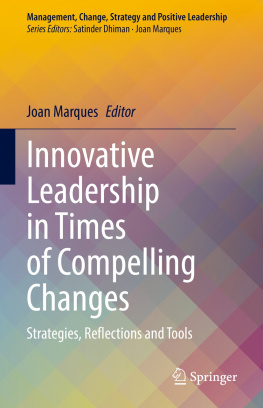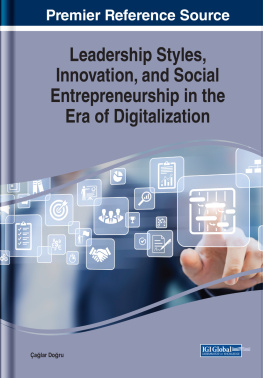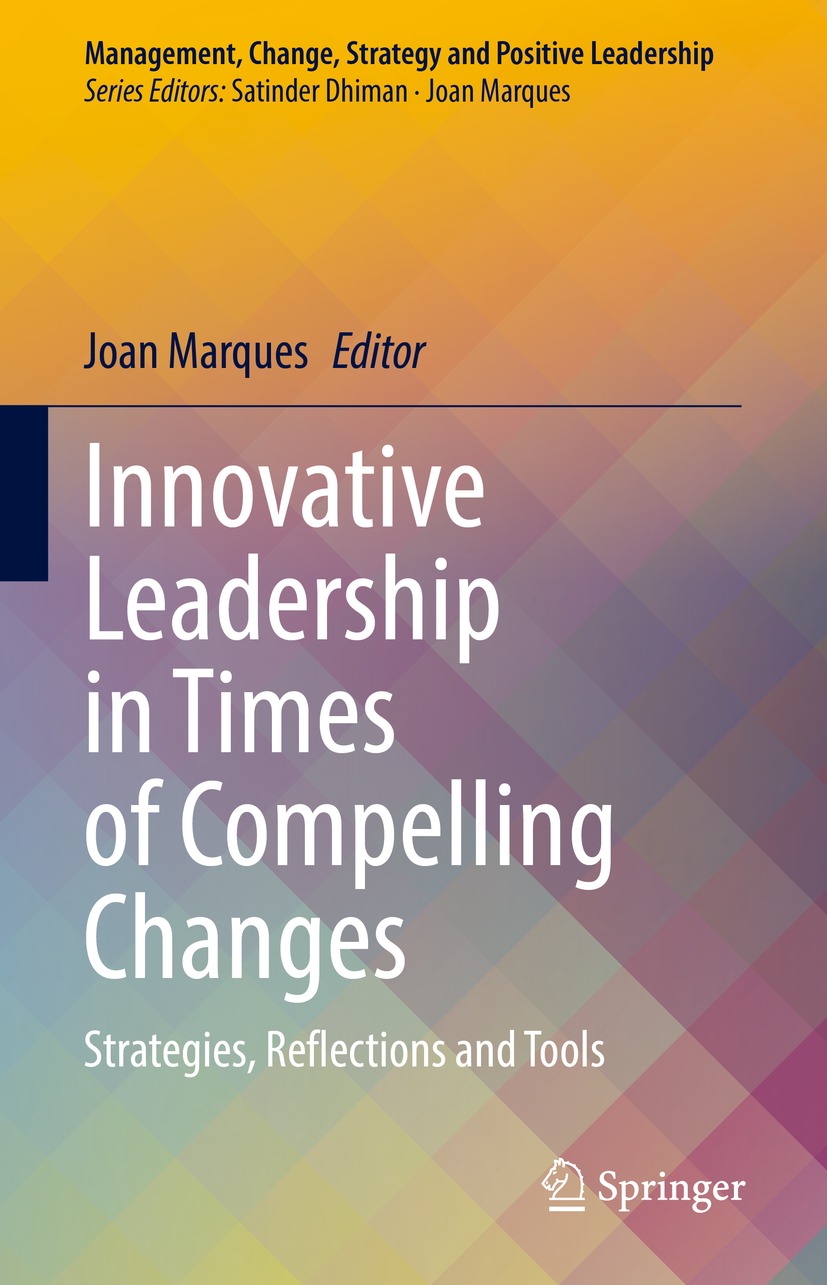Editor
Joan Marques
Woodbury University, Burbank, CA, USA
ISSN 2662-3080 e-ISSN 2662-3099
Management, Change, Strategy and Positive Leadership
ISBN 978-3-030-67257-7 e-ISBN 978-3-030-67258-4
https://doi.org/10.1007/978-3-030-67258-4
The Editor(s) (if applicable) and The Author(s), under exclusive license to Springer Nature Switzerland AG 2022
This work is subject to copyright. All rights are solely and exclusively licensed by the Publisher, whether the whole or part of the material is concerned, specifically the rights of translation, reprinting, reuse of illustrations, recitation, broadcasting, reproduction on microfilms or in any other physical way, and transmission or information storage and retrieval, electronic adaptation, computer software, or by similar or dissimilar methodology now known or hereafter developed.
The use of general descriptive names, registered names, trademarks, service marks, etc. in this publication does not imply, even in the absence of a specific statement, that such names are exempt from the relevant protective laws and regulations and therefore free for general use.
The publisher, the authors and the editors are safe to assume that the advice and information in this book are believed to be true and accurate at the date of publication. Neither the publisher nor the authors or the editors give a warranty, expressed or implied, with respect to the material contained herein or for any errors or omissions that may have been made. The publisher remains neutral with regard to jurisdictional claims in published maps and institutional affiliations.
This Springer imprint is published by the registered company Springer Nature Switzerland AG
The registered company address is: Gewerbestrasse 11, 6330 Cham, Switzerland
Preface
This collective volume was created through a wonderful collaboration of 33 authors, representing six global continents and bringing along a wide range of academic and practical disciplines. This extraordinary work focuses on the need for leaders in personal and professional realms, for-profit and nonprofit, to understand the importance of innovative thinking in order to achieve more responsible progress, safeguard sustainability, and achieve enhanced satisfaction and motivation among stakeholders. This can only happen through an augmented level of design thinking, which will lead to increased innovation, and thus, future-oriented leadership.
Through this book, the widely diverse team of authors presents a multitude of insights and approaches geared toward leading in a more responsible way. They present a set of reflective stances, cautionary points, and roadmaps for leaders who aim to do the right thing. From crisis management to spiritual practices, and from pro-social concepts to social responsibility and sustainability: the common denominator is a collective and concerted effort to developing leadership behaviors and strategies to safeguard generations to come. The profound shift we aim to accomplish with this work is from an understanding that we decide what we leave our descendants to one where we understand that we have the earth in loan from our progenies, so we should become more respectful and mindful in our planning and decision-making.
Given its emphasis on the unprecedented times we live in, evoking an urgent need for innovative and visionary thinking, this book focuses on three areas, classified into three parts:
Leading at a personal level focused on individuals who want to practice right livelihood in any situation they currently reside, whether formally leading or not. The aim will be to increase awareness and reduce ignorance through this section.
Leading at a strategic level focused on those who perform in organizational settings, most likely at the strategic and/or executive level, where decisions are made to affect long-term performance of organizations and their stakeholders.
Leading with an innovative mindset focused on both above-mentioned categories, yet, with the infusion of a visionary approach in actions and decision-making processes.
Part I, titled Personal Leadership to Address Spiritual Challenges and Invoke Design Thinking consists of eight chapters
In Chap. , titled, Awakened Leadership: Leading with Light, Joan Marques provides a mental and emotional framework to help readers understand how to deal with challenging situations both those we can and those we cannot change. After first reflecting on a long-standing concern among members in society when it comes to the short-term, excessive profit focus among leaders, she discusses the concept of wakefulness, briefly analyzes a series of contemporary leadership styles, and subsequently lays out a behavioral roadmap for those interested in adopting a reflective, awakened leadership approach.
In Chap. , Mindfulness as a Strategy to Weather Challenges, Carrie Amani Annabi, considers physiological, sociological, and positive psychological research to help us better understand historic and contemporary studies that feed into business management and leadership disciplines. Her goal is to help readers rationalize and position mindfulness, leading to the understanding that mindfulness is a logical answer for leaders faced with continued challenges.
In Chap. , Inclusive Leadership in an Increasingly Diversified World, Babar Dharani and Kurt April invite leaders to break free from the fixation on in-groups and out-groups in their work environments. They suggest that exposure to diversity is a foundational step to break free from this fixation. Considering the surge in awareness on diversity management, these authors consider the role of leadership for enhancing diversity and securing inclusion therein to be profound. They explain inclusion as ensuring justice and equity, enabling people to belong to a group while helping them preserve their uniqueness, becoming conscious of ones own privileges, and finding the voice to express our concerns and opinions skillfully when out-grouped.
In Chap. , Leading Reflectively: Treading the Noble Eightfold Path, Joan Marques presents leadership as a personal choice and discusses within the scope of Buddhist psychology the four noble truths, comprising the noble eightfold path, as a useful strategy to identify a set of behaviors that can reduce suffering at the personal and societal level. In each of the elements of the eightfold path, she presents an individual who exerted strong personal leadership, often at the odds of all other opinions, and established a positive change internally as well as for his or her society.










